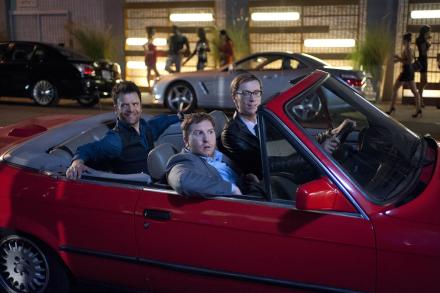
BD: There a fall in Hello Ladies that is pure Only Fools and Horses.
SM: Yes. It's a homage although that scene was written by co-writer Gene Stupnitsky (Merchant's co-writer along with Lee Eisenberg) who had never seen OFAH, but when I was doing it I was aware of that. David Baddiel said with drama there's many ways of performing something, but in comedy there is only one way to make it funny. I guess when you are the performer there is only one way.
BD: John Cleese is a big hero?
SM: I was too young for Python but saw constant repeats in 1980s. I had the scripts and I'd read along to them. I was obsessed with Python and Cleese in particular.
BD: The height thing?
SM: That was the direct correlation but I really responded to the character in Fawlty Towers. The pent up aggression and neediness for social acceptance. Pomposity. Pretentiousness. There was something about that character that was very vivid to me.
There's an element of it in Stuart. There is some Fawltyesque frustration when I organise a pool party and the pool is double booked with a kids party. Stuart is never totally Fawltyesque but that frustration of trying to keep plates spinning, desperation to keep the ship afloat, is there.
BD: A lot of British comedy is about status?
SM: My ego is not such that I need to be right all the time and that's in British comedy – Hancock, Harold Steptoe, Fawlty, Partridge, Brent. Captain Mainwaring had to prove himself all the time. There's a class thing that is shot through British comedy that is not quite the same in America, the middle class person wanting acceptance and slightly intimidated by the upper classes.
BD: Where will you be watching Hello Ladies?
SM: I've never watched anything I've done when it was on. I remembering going to play pool the night of the second broadcast of the Office Christmas special and overhearing people talking about it being brilliant and thinking why aren't you at home watching it?
BD: What's more important US or UK success?
SM: I honestly don't think about it quite like that. I'd like people to watch it and I'd like to continue to work on it, but I've always done things based on enjoying the project. You spend so much time and energy on these things if I want money there are so many easier easy of doing it, for me it's the thrill of the project, creating that universe. The only success I want is that they will keep letting me do this. I would hate it for English people to think I was turning my back on England. It's not "if everyone in Idaho knows who I am then I've made it" That's not the motivation.
BD: How famous are you in America?
SM: Not huge, it's just comedy fans. In LA it's different and periodically I get recognised by families who get excited because their kids have made them watch me in The Tooth Fairy eight times that day.
BD: Can you get into clubs easily?
SM: Not always. Some restaurants have a database so when you call up they will check your IMDB page to decide who you are. In the show there's a joke about this. I remember coming over when The Office had won a Golden Globe and I was very excited. I thought this is my town now and I was put on thelist for new club, so I walked up and said I was on the list and the doorman said "which list?" which threw me. I said how many lists are there? he said "two" I asked him to check both and he said he didn't have time so I stood there like a lemon while he let in various beautiful people. Eventually I had to sheepishly go off into the night even though I was on the list.
BD: Do you like America?
SM: The things that appeal are the weather, surprisingly superficial things. And I do like the change of scenery, I do like the fact that you can drive to the beach and have an ice cream on the pier, quality of life. I like being able to ski even though I don't. I like the theory of it. But I also like the idea of working with new crews. Hollwyood has an allure because I was such a movie nut growing up. I was shooting on the Disney film lot where Phil Silvers filmed.
BD: One of your friends in Hello Ladies is in a wheelchair. That seems to crop up in your work. Why?
SM: The producer of The Office, Ash Atalla, uses a wheelchair. I knew a kid who was a wheelchair user, Gene went to college with one. What was interesting was that despite his disability he isn't using  that as his way in to seducing women, he's kind of got his own demons. But it is really the idea of this tableau of people that are outsiders - the silhouette, too tall, too stocky, wheelchair, we are misfits in a town of beautiful people. There is something about this image of us trailing behind the beautiful people - as they are getting on the yacht we are struggling along the harbour.
that as his way in to seducing women, he's kind of got his own demons. But it is really the idea of this tableau of people that are outsiders - the silhouette, too tall, too stocky, wheelchair, we are misfits in a town of beautiful people. There is something about this image of us trailing behind the beautiful people - as they are getting on the yacht we are struggling along the harbour.
I remember the Pied Piper of Hamelin leads all the kids into Paradise and the kid on crutches doesn't make it in time and can't get in. I always remember thinking he's the loneliest kid, not only on crutches but gets a weird punishment, something about the idea of the guy on crutches being left out…metaphorically for my character..
BD: It's pretty amazing that only three years ago you were doing Hello Ladies in London pubs and now it's on HBO.
SM: The reason I went back to stand-up was a niggling feeling that I'd never quite cracked it. I did a myriad of those open spots to try to get back in the groove. Never with the intention of touring, just doing it as a new challenge, Simon Cowell's woeful phrase of getting out your comfort zone. Ricky was engaging with the audience and I'd lost touch. i thought it might keep my tools a bit sharper. My agent persuaded me to tour, I did it reluctantly then this came off the back of that so it was quite organic.
BD: So what's next, another tour?
SM: I'm not obfuscating, there's nothing planned. I have a vague idea of a stand-up show about the notion of being cool, it feels like natural extension of last show. I alway think about smoking being cool,when you see James Dean in black and white, so we are seduced by that but the irony is when you see people huddled in the rain outside an office block it's the least cool thing. But that's as far as I've got.
BD: You've been away since March. What have you missed about England?
SM: I don't watch much TV but I do miss the Today programme and rigorous new analysis and esoteric BBC4 docs. And Melvyn Bragg's In Our time podcasts are a bit of an obsession. I was driving a convertible - because I'm an asshole! – and I pulled up alongside an attractive woman at the lights and glanced across thinking I was a player then realised I was listening to a podcast about the English Civil War. It was this weird meeting of America and England.
I was frustrated to have missed Murray winning Wimbledon, there's nothing better than English sports success. I miss friends and I missed sister having a baby, but one thing was feeling out of the loop with TV icons being knocked off their pedestals. There was a sense of being on the outside looking back which made it look more distressing. When Savile was on news The Daily Show did the story and showed his picture and the audience erupted into laughter. Seeing it from this distance makes it all the more weird. It's my childhood being dismantled.
BD: What are your ambitions?
SM: I would like to do direct drama. I tend to watch drama more than I watch comedy. I'm always scared of being the comedian who overreaches and embarrasses themselves. When in was younger I was annoyed with Woody Allen trying to make serious films but now I understand the impulse. There is something more exciting about trying to make The Sopranos, something that is dark, funny and profound. That's why drama is ultimately more enriching, it can do everything. Every time I sit down to write I remember how hard it is, but it's sort of hard to do anything well.
See Stephen Merchant's lip-synch battle


